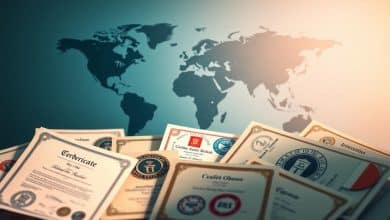How to Prepare for Global Job Interviews Successfully
Receiving an invitation to discuss a role is an exciting opportunity to showcase your skills. For candidates navigating cross-cultural hiring processes, preparation goes beyond polishing resumes. Understanding regional expectations and employer priorities becomes critical to making a strong impression.
International applicants often face distinct challenges. Work authorization logistics, cultural competency evaluations, and communicating value across borders require strategic planning. Tailoring responses to address these factors helps candidates stand out in competitive environments.
Effective preparation combines traditional methods with specialized insights. Researching company values, practicing scenario-based questions, and refining cross-border communication skills build confidence. Many hiring managers prioritize adaptability alongside technical expertise during evaluations.
This guide explores proven strategies for navigating complex hiring landscapes. From optimizing application materials to mastering cultural nuances, these approaches help transform potential hurdles into advantages. The techniques outlined reflect current trends in multinational recruitment and employer expectations.
Introduction to Global Job Interviews
Navigating cross-cultural hiring processes demands more than polished credentials. Modern employers seek professionals who balance technical mastery with cultural awareness. This dual focus reflects today’s interconnected business landscape, where collaboration across borders drives innovation.
Understanding the Importance in Today’s Competitive Market
Organizations now prioritize candidates who adapt to diverse teams while delivering results. A recent study found 78% of hiring managers value cultural adaptability as highly as technical skills. “The ideal candidate bridges expertise with an understanding of regional workplace norms,” notes a multinational HR director.
Competition for roles intensifies as companies expand internationally. Applicants must articulate how their background aligns with organizational values. For example, demonstrating familiarity with a company’s sustainability initiatives could strengthen a candidate’s position in environmentally conscious industries.
Successful professionals treat interviews as two-way conversations. They assess whether the organization’s growth opportunities match their career trajectory. This approach builds mutual respect and clarifies expectations from both sides.
“Adaptability isn’t just about relocation—it’s about thriving in dynamic environments.”
Preparation strategies now include analyzing industry-specific communication styles. Tech startups might favor informal problem-solving discussions, while financial institutions often expect structured responses. Tailoring your approach shows awareness of these nuances.
Proven global job interview tips for International Candidates
Standing out in cross-border hiring processes requires more than qualifications—it demands strategic mental preparation. Candidates who balance technical abilities with emotional intelligence often gain an edge. This approach helps transform potential obstacles into moments to demonstrate adaptability.
Setting a Strong Mindset for Success
Viewing challenges as growth opportunities shifts how candidates present themselves. Systematic preparation builds confidence by addressing both technical skills and personal presentation. One recruiter states: “The best applicants showcase their authentic selves while aligning with company values.”
Mental readiness involves practicing clear communication that highlights unique strengths. Role-playing common scenarios helps candidates respond calmly under pressure. Regular self-reflection also identifies areas for improvement before important discussions.
Leveraging Expert Resources and Preparation Tools
Specialized support services simplify complex processes like visa applications and cultural integration. Many institutions offer tailored assistance through resume workshops and mock discussions. These resources help applicants understand regional expectations while maintaining their authentic voice.
Advisors provide timelines for work authorization and clarify employment regulations. Their guidance ensures candidates meet deadlines and avoid common pitfalls. Combining these services with personal preparation creates a robust foundation for success.
“Your mindset determines whether obstacles become roadblocks or stepping stones.”
Researching the Job Market and Interview Requirements
Thorough preparation separates proactive candidates from reactive ones. Employers increasingly value applicants who demonstrate deep understanding of role-specific demands alongside compliance awareness. This dual focus ensures readiness for both technical evaluations and logistical realities.
Analyzing Job Descriptions and Desired Qualifications
Start by dissecting the job description to identify core responsibilities and must-have skills. Compare your experience with listed requirements—highlight projects where you’ve demonstrated similar qualifications. If details seem sparse, study equivalent roles at competing organizations to uncover industry patterns.
Students navigating visa regulations should note key distinctions. F-1 visa holders can utilize CPT for internships during studies or OPT for post-graduation work. STEM graduates gain extra flexibility through 24-month OPT extensions in specialized fields.
Understanding Visa and Work Permit Processes
Timing matters when submitting Form I-765 for employment authorization. Approval delays could affect start dates, so file applications early. Maintain clear records of submission confirmations and USCIS email communications for reference.
Research your target organization’s culture alongside role expectations. Knowing their sustainability initiatives or team structures helps tailor responses during the interview process. This shows alignment with their environment while addressing unspoken priorities.
Crafting a Winning Resume and Personal Pitch
A standout resume acts as your professional passport across borders. It must bridge cultural gaps while showcasing expertise. Applicants often underestimate how formatting choices or skill prioritization vary between regions.
Tailoring Your Resume to International Standards
Begin by aligning your resume’s structure with the company’s location. European firms often prefer concise two-page formats with professional photos, while U.S. employers prioritize one-page clarity. Use metrics to demonstrate achievements—“Increased sales by 30%” holds universal appeal.
Transferable skills become critical when shifting industries. A project manager transitioning to tech could emphasize leadership in cross-functional teams. Career strategist Lena Torres notes: “Employers want proof you’ll solve their specific problems, not just replicate past roles.”
Create multiple resume versions for different applications. Highlight language proficiencies and international collaborations for multinational companies. For startups, focus on adaptability and innovation. Always mirror keywords from the position description to pass automated screenings.
Your personal pitch should address cultural fit concerns proactively. Briefly explain how your background complements the organization’s goals. This builds trust while differentiating you from local candidates.
Showcasing International Experience and Cultural Adaptability
Cultural adaptability shines when candidates connect personal growth to workplace value. Employers increasingly seek professionals who translate diverse experiences into collaborative problem-solving. This goes beyond listing countries visited—it’s about demonstrating how exposure to different cultures shapes professional approaches.
Highlighting Global Experiences and Transferable Skills
A student who documented historical sites through photography gains storytelling skills applicable to client presentations. Leading campus clubs with international members builds conflict-resolution strategies. These experiences reveal how candidates navigate ambiguity—a trait valued in multinational teams.
Consider framing volunteer work or language exchanges as evidence of curiosity. One hiring manager notes: “Applicants who discuss learning local customs during travels often handle cross-departmental projects more effectively.” Such stories show employers you engage with people beyond surface-level interactions.
Even hobbies like cooking international cuisines or studying regional art can demonstrate observational skills. These activities require adapting techniques to new contexts—similar to adjusting workflows across offices. Always link personal growth moments to job-specific competencies during discussions.
“Your ability to thrive abroad starts with how you articulate everyday learning moments.”
Mastering Challenging Interview Questions and Scenarios
Candidates facing multinational hiring panels often encounter three critical question types requiring distinct preparation approaches. Success hinges on balancing technical precision with cultural awareness while addressing logistical concerns transparently.
Addressing Technical, Behavioral, and Cultural Questions
Technical assessments evaluate problem-solving methods more than answers. One software engineer shared: “I walked through my debugging process aloud—the team later said that transparency mattered more than the solution.” Structure responses using:
- STAR method for behavioral situations (Situation, Task, Action, Result)
- Industry-specific frameworks for technical challenges
- Cultural references demonstrating adaptability
When discussing career goals, connect personal ambitions to company milestones. A candidate might say: “Developing multilingual customer support systems aligns with my interest in scaling global user experiences.” This shows strategic alignment without compromising authenticity.
Navigating Difficult Inquiries on Work Permits
Employers prioritize candidates who understand authorization timelines. Proactively share your visa status and required processing time. For example: “My OPT authorization begins June 1st, allowing immediate project contributions while we pursue long-term sponsorship.”
Prepare a concise summary covering:
- Current work eligibility status
- Expected documentation completion dates
- Plans for status renewals if applicable
“Clear communication about legal requirements builds trust faster than any resume bullet.”
Practice explaining complex processes simply. Instead of detailing I-765 form specifics, state: “I’ve submitted all materials for employment authorization and track updates weekly.” This demonstrates responsibility without overwhelming the conversation.
Conclusion
Securing an international opportunity marks just the beginning of a transformative career journey. Candidates who invest time understanding regional workplace norms position themselves as adaptable assets. Researching the company’s values and practicing clear communication strategies builds trust during critical discussions.
Every interaction with an interviewer offers chances to demonstrate problem-solving abilities. Focus on how your background addresses the position’s unique demands while aligning with organizational goals. Proactive applicants often explore visa support services early, ensuring smooth transitions if selected.
Success in cross-border hiring hinges on balancing confidence with curiosity. Ask thoughtful questions about team dynamics and growth trajectories. This approach shows commitment to contributing meaningfully while advancing your professional path.
With strategic preparation and cultural awareness, candidates transform challenges into stepping stones. Each opportunity becomes a platform to showcase resilience and readiness for collaborative, borderless work environments.
FAQ
Why is cultural adaptability critical for international roles?
How can candidates tailor resumes for global opportunities?
What resources help prepare for visa-related interview questions?
Which skills are most valued in global hiring processes?
How does LinkedIn Learning aid in interview preparation?
What strategies address gaps in international work experience?
Published on: 17 de August de 2025







